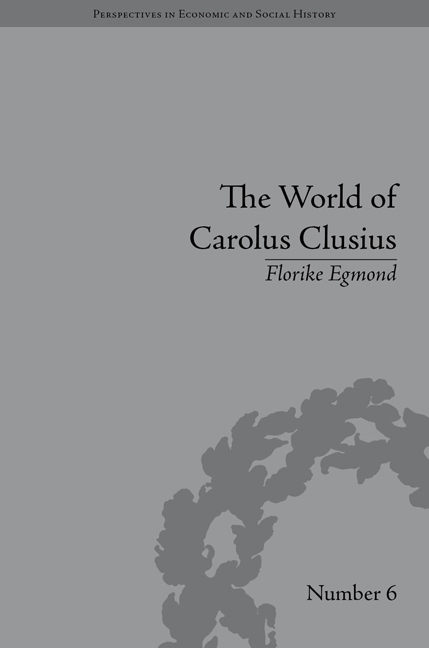Book contents
- Frontmatter
- CONTENTS
- Miscellaneous Frontmatter
- Preface
- Technical Note
- Abbreviations
- List of Figures
- Introduction
- I The Southern Netherlands
- II Habsburg Women
- III Italy
- 5 Growing Expertise: Gardeners, Collectors, Naturalists
- 6 Nature in the Garden: The Rise of the Expert Naturalist
- IV France
- V Holland
- VI Beyond Place
- Conclusion
- Notes
- Works Cited
- Index
6 - Nature in the Garden: The Rise of the Expert Naturalist
from III - Italy
- Frontmatter
- CONTENTS
- Miscellaneous Frontmatter
- Preface
- Technical Note
- Abbreviations
- List of Figures
- Introduction
- I The Southern Netherlands
- II Habsburg Women
- III Italy
- 5 Growing Expertise: Gardeners, Collectors, Naturalists
- 6 Nature in the Garden: The Rise of the Expert Naturalist
- IV France
- V Holland
- VI Beyond Place
- Conclusion
- Notes
- Works Cited
- Index
Summary
In no other part of Italy were Clusius's contacts so concentrated, intensive or long-lived as in the Veneto – in the sense of both direct exchanges and indirect information about other garden owners, collectors and naturalists. In the rest of Italy his contacts were fewer and farther between in a geographical sense, and for the most part concentrated in the 1590s and 1600s. That, of course, was primarily a result of Pinelli's role and the way in which Clusius's network functioned. Clusius's other Italian contacts were as interesting, however, in terms of their expertise and specific interests.
Botanical Advisors to the Ruling Families
Members of various religious orders – and the Capuchins in particular, as Olmi has shown – played an important part in research concerning living nature in Italy. Two of them were especially relevant to Clusius, and acted as horticultural and botanical advisors to some of the most important ruling families of their time. Evangelista Quattrami (b. 1527), an Augustinian friar from Gubbio in Umbria with a doctorate in theology, acted as chief herbalist and distiller for several members of the Este family from about 1569, both in Ferrara and on their estates in Rome and environs. The gardens with which Quattrami was involved were, indeed, among the most prestigious locations in the whole of Italy. During the late 1570s, he acted as superintendent of the Este garden on Monte Cavallo (Quirinal) in Rome.
- Type
- Chapter
- Information
- The World of Carolus ClusiusNatural History in the Making, 1550–1610, pp. 91 - 106Publisher: Pickering & ChattoFirst published in: 2014



